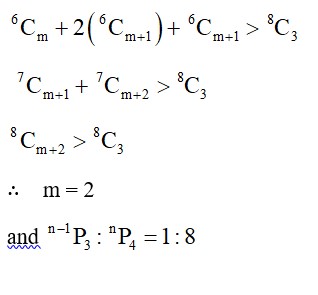Let S = . If then T = n(S) is equal to
Let S = . If then T = n(S) is equal to
sinθ = 0 and 1 + sin θ = 2 cos2 θ = 2 – 2 sin2 θ ………….(i)
θ = np
θ = -p, p, 0
From (i), 2 sin2 θ + sin θ - 1 = 0
(2 sin θ - 1) (sin θ + 1) = 0
sin θ = -1,
is rejected.
T = cos (-2p) + cos 2p + cos θ + cos
T + n(s) = 4 + 5 = 9
Similar Questions for you
Start with
(1)
(2)
(3) GTE : 4!, GTN: 4!, GTT : 4!
(4) GTWENTY = 1
⇒ 360 + 60 + 60 + 24 + 24 + 24 + 1 = 553
x + 2y + 3z = 42
0 x + 2y = 42 ->22 cases
1 x + 2y = 39 ->19 cases
2 x + 2y = 36 ->19 cases
3 x + 2y = 33 ->17 cases
4 x + 2y = 30 ->16 cases
5 x + 2y = 27 ->14 cases
6 x + 2y = 24
Total ways to partition 5 into 4 parts are:
5 0
4 1 0
3 2 0
3 1 0
2 1
51 Total way
After giving 2 apples to each child 15 apples left now 15 apples can be distributed in
15+3–1C2 = 17C2 ways
Taking an Exam? Selecting a College?
Get authentic answers from experts, students and alumni that you won't find anywhere else.
On Shiksha, get access to
Learn more about...

Maths NCERT Exemplar Solutions Class 12th Chapter One 2025
View Exam DetailsMost viewed information
SummaryDidn't find the answer you were looking for?
Search from Shiksha's 1 lakh+ Topics
Ask Current Students, Alumni & our Experts
Have a question related to your career & education?
See what others like you are asking & answering




